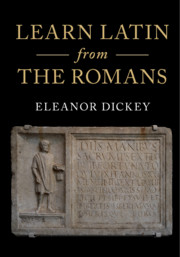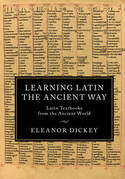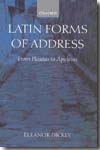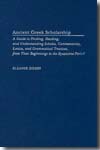Learn Latin from the Romans
a complete introductory course using textbooks from the Roman Empire
- ISBN: 9781316506196
- Editorial: Cambridge University Press
- Fecha de la edición: 2018
- Lugar de la edición: Cambridge. Reino Unido
- Encuadernación: Rústica
- Medidas: 24 cm
- Nº Pág.: 512
- Idiomas: Inglés

Learn Latin from the Romans is the only introductory Latin textbook to feature texts written by ancient Romans for Latin learners. These texts, the 'colloquia', consist of dialogues and narratives about daily life similar to those found in modern-language textbooks today, introducing learners to Roman culture as well as to Latin in an engaging, accessible, and enjoyable way. Students and instructors will find everything they need in one complete volume, including clear explanations of grammatical concepts and how Latin works, both British and American orders for all noun and adjective paradigms, 5,000 easy practice sentences, and over 150 longer passages (from the colloquia and a diverse range of other sources including inscriptions, graffiti, and Christian texts as well as Catullus, Cicero, and Virgil). Written by a leading Latin linguist with decades of language teaching experience, this textbook is suitable for introductory Latin courses worldwide.
-Passages are taken from leading literary writers like Cicero, Catullus and Virgil, and from inscriptions and graffiti, as well as the 'colloquia'.
-Grammatical terminology is introduced from the start, allowing students to gain confidence immediately.
-All noun and adjective paradigms are given in both the British order and the American order.
-Includes over 5,000 short practice sentences and over 150 longer passages for continuous reading practice.
Introduction
The pronunciation of Latin
Part I:
1. Verbs: inflection and word order
2. Nouns: nominative, vocative, and accusative of first and second declensions
3. Adjectives: gender, agreement, neuters, and vocabulary format
4. Tenses: future, perfect, and principal parts
5. Genitive case, sum
6. First and second conjugations, past participles
7. Dative case, possum
8. Second declension in -r and -ius, substantivization
9. Ablative case, prepositions, e?
10. Demonstratives and imperatives
11. Reading texts
Part II:
12. Personal pronouns, partitive and objective genitives
13. Present subjunctive, quis
14. Third declension
15. Subordination, imperfect subjunctive, purpose clauses
16. Sequence of tenses
17. Fourth and mixed conjugations
18. Reading practice
19. Infinitives and indirect statement
20. Reflexives
21. Third-declension adjectives
22. Reading practice
Part III:
23. Demonstratives, ablative of agent
24. Participles
25. Relative clauses and vol?
26. Reading practice
27. Deponent verbs: forms from first two principal parts
28. Indirect commands
29. Deponent verbs: perfect-stem forms
30. Fear clauses and long sentences
31. Reading poetry
Part IV:
32. Passive voice, agent and means
33. Result clauses
34. Fourth and fifth declensions
35. Time and place
36. Reading practice
37. N?l? and m?l?
38. Regular comparison
39. Imperfect tense
40. Irregular comparison, negatives
41. Gerundives
42. Reading practice
43. Adverbs
44. Pluperfect and future perfect tenses
45. Impersonal verbs
46. Perfect and pluperfect subjunctives
47. More subordinate clauses
48. Reading practice
Part V:
49. Fer?
50. Conditional clauses
51. F??
52. Ipse and iste
53. Reading practice
54. Indirect questions
55. Numbers
56. Relative clauses with the subjunctive
57. Ablative absolute
58. ?dem, expressions of price and value
59. Reading practice
60. Gerunds I
61. Gerunds II
Appendices:
62. How to use the appendices
63. Further grammatical explanations and exercises
64. Key to further exercises
65. Alphabetical glossary of grammatical terminology
66. The metre of Virgil's Aeneid
Cumulative vocabulary, Latin to English
Cumulative vocabulary, English to Latin
Index of grammatical topics covered
Index of Latin passages included.









